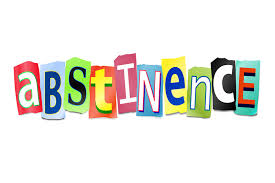What is Abstinence?
The definition of abstinence is when you don’t have sex. Outercourse is other sexual activities besides vaginal sex. People are abstinent for lots of different reasons. Sometimes, people use abstinence as birth control to prevent pregnancy. Abstinence can mean different things depending on who you ask. Many people say abstinence is not doing ANY kind of sexual stuff with another person, including vaginal, oral, and anal sex — that’s what we’re calling abstinence here.
Abstinence prevents pregnancy by keeping semen away from the vagina, so the sperm cells in semen can’t get to an egg and cause pregnancy. If you’re abstinent 100% of the time, pregnancy can’t happen. People sometimes only use abstinence to prevent pregnancy on days they’re fertile (most likely to get pregnant), but they may have vaginal sex at other times. This is called fertility awareness.
Anybody can be abstinent, no matter your age, gender, sexuality, or the sexual experiences you’ve had before. People are abstinent off and on for reasons that may change over time, and a few are abstinent their whole lives. You can choose to be abstinent whenever you want, even if you’ve had sex before. While abstinence and celibacy are often used interchangeably, celibacy is usually viewed as a decision to abstain from sexual activity for religious reasons. Someone who has taken a vow of celibacy is practicing abstinence. But in this case, it’s usually seen as a long-term decision.
For some people, abstinence means not having any kind of sex. For other people, abstinence-only means not having vaginal sex, but other sexual activities are allowed. When it comes to preventing pregnancy, all the sexy stuff besides vaginal sex is called “outercourse.”
Are There Any Side Effects of Abstinence in Females?
There are NO side effects of abstinence in either men or women. Abstinence is a great choice for so many reasons. Here is a list of the most important reasons to practice abstinence, and why sexual abstinence is a ‘big deal’.
- Sexual abstinence is the only 100% guarantee that you won’t become a mommy or a daddy until you’re ready. (No stretch marks, no crying babies, no poopy diapers – until you’re ready!)
- Sexual abstinence is the only 100% guarantee that you won’t get an STD. (While latex condoms can help prevent some STDs, they are not nearly 100% effective. Condoms don’t prevent HPV, gonorrhea, or genital herpes among many other STDs)
- Having sex with an individual has psychological repercussions. If there is a breakup, increased chances of depression and unstable mental health are higher.
- Practicing sexual abstinence is a great way to get to know your boundaries and develop a stronger relationship emotionally and spiritually with the person you are dating.
- You won’t need to hide anything from your parents or your friends, which takes a lot of pressure off your back and helps strengthen your relationship with them.
- You will know that the person you are with, is with you for YOU. Your personality, your interests, and all of the great things about you besides sexuality.
- Statistics show that teens who practice sexual abstinence are less likely to have depression, less likely to attempt suicide, less likely to live in poverty as adults.
- Statistics show that teens who practice sexual abstinence are likely to do better in school. (Twice as likely to graduate from college than teens who do not practice abstinence).
How Do I Talk with My Partner About Being Abstinent?
Talking with your partner about your decision to abstain from sex play is important — whether or not you’ve had sex play before. Partners need to be honest with each other and make sexual decisions together. These are some of the best ways to keep a relationship happy. Even so, it may not be easy to do. You may feel awkward or embarrassed.
- It’s best to talk about your feelings before things get sexual. For many people, it’s hard to be clear about what they want if they get aroused. It is helpful to think — ahead of time — about how you can say “no” to sex play. What behavior will be clear? What words will be best? You can practice saying the words out loud. Then think about how someone might respond to you.
- Take the time to consider fully what being abstinent will mean for you. It is important to know what you are thinking and feeling and what you need. Then you can tell your partner about it.
- Be straightforward about the limits you want to set.
Keep in mind that having sex is not the only way two people can get to know each other. Sex play is also not the only way couples can be close. People get closer as they build trust by:
- talking
- listening
- sharing
- being honest
- respecting each other’s thoughts and feelings
- enjoying one another’s company
Abstinence can only work when both partners agree to it. So it is also helpful to keep talking with each other about why you’ve agreed to abstain from sex play. Your relationship may change. And your decision to be abstinent may change, too.
How Can I Stay Abstinent?
Staying abstinent is a choice you make every day. There are ways to help yourself with that choice.
- Remind yourself why you chose to be abstinent.
- Think about the consequences.
- Don’t reevaluate your decision to stay abstinent during sexually charged situations — stick with your decision until you can think about it with a clear head.
Abstinence can be difficult for some people. Women and men need to be clear about their reasons to stay abstinent. If you are tempted to have sex play, it helps to remember why you made the decision to be abstinent in the first place. How can you stay abstinent? Think about your answers to these questions:
- Am I clear about why I want to be abstinent?
- Am I aware of situations that could make staying abstinent difficult for me? Can I avoid them?
- Alcohol and other drugs can affect my judgment and decision-making ability. How do I feel about not using them?
- Are there people in my life I can talk to about my decision to be abstinent? Will they be supportive?
Most people stop being abstinent at some point in their lives. When you decide not to be abstinent, ask yourself
- Do I have information about other methods of birth control and do I have access to them?
- Do I know how to protect myself from STDs?
There are so many other personal, social, and economical reasons why abstinence is a great idea. But ultimately, it all comes down to personal choice. What do you choose? Take some time to think about this. SEE: Are There Side Effects of Not Releasing Sperm







